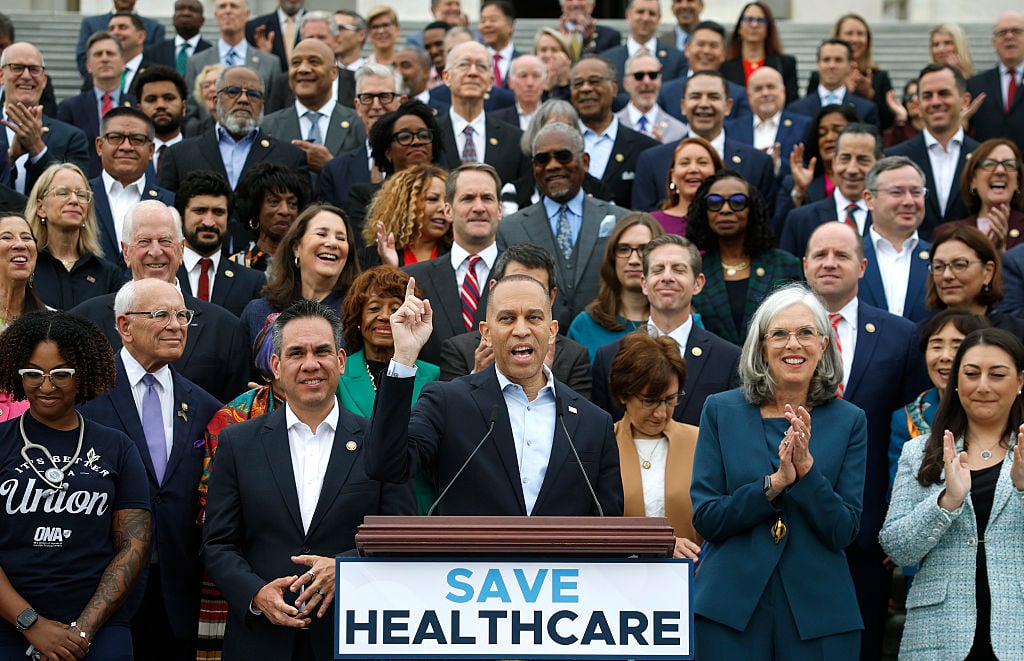The Government Shutdown: A Tale of Political Tug-of-War
At precisely 12:01 a.m. on a Wednesday, the federal government came to a standstill, leaving hundreds of thousands of federal employees without pay. Federal agencies across the nation were shuttered, creating a ripple effect that many Americans would soon feel. This shutdown, however, ignited a fierce debate in the nation’s capital about who bears responsibility for the impasse.
The Blame Game
As the sun rose on a new day, President Donald Trump and congressional Republicans were quick to blame the Democrats. Their failure to forge a bipartisan deal to fund the government before the October 1 deadline left Republicans pointing fingers at their opposition. “After months of making life harder and more expensive, Donald Trump and Republicans have now shut down the federal government because they do not want to protect the healthcare of the American people,” declared Rep. Hakeem Jeffries, the U.S. House of Representatives Minority Leader from New York.
Jeffries articulated a sentiment that resonated with many Democrats: a willingness to work toward a bipartisan resolution. However, this cooperation hinges on Republicans agreeing to address the escalating healthcare crisis — an issue that sits firmly at the heart of the political deadlock.
Healthcare as a Sticking Point
Central to the divisions is a refusal from Republicans to extend tax credits under the Affordable Care Act (ACA), a critical lifeline for many Americans during the pandemic. These credits are set to expire, putting healthcare affordability at risk. Democrats are also advocating for the restoration of over $1 trillion in cuts to Medicaid and Medicare that had been implemented under Trump’s controversial “One, Big, Beautiful Bill.”
Republicans, on the defensive, accuse Democrats of advocating for healthcare entitlement extensions that could benefit undocumented immigrants. Yet, federal law already excludes most undocumented individuals from accessing these benefits, suggesting that the Republican narrative may be more about political maneuvering than factual accuracy.
The Accusations Fly
As tensions mounted, Jeffries criticized Trump for lowering the discourse instead of engaging in meaningful negotiations. The President had been accused of behaving erratically, shifting away from constructive dialogue to posting “crazed, deep fake videos” targeting his opponents. This behavior not only fueled frustration among Democrats but also shifted focus away from resolving a pressing national issue.
The Human Cost of the Shutdown
The impact of the shutdown is not just political; it echoes deeply in communities across the country. Rep. Yvette D. Clarke, chairwoman of the Congressional Black Caucus, emphasized that many minority communities would bear the brunt of these political games. “Black communities,” she noted, “are particularly vulnerable,” suggesting that the implications of funding cuts could close critical healthcare facilities that serve these populations.
Clarke reiterated that “1 in 5 Medicaid enrollees are Black,” highlighting how drastic cuts could lead to the shuttering of hospitals and clinics that rely on federal funding. The lack of negotiation and the partisanship displayed had dire ramifications for individuals who rely on these services for their livelihoods.
Health Crisis on the Horizon
As discussions continued, Democrats maintained their advocacy for extending Obamacare tax credits. They warned that failing to do so would drive health insurance premiums beyond reach for many, particularly in underserved communities. Clarke poignantly pointed out that the cuts would adversely affect medical research for diseases disproportionately impacting Black Americans, such as heart disease and diabetes.
A Call to Action
Rep. Ayanna Pressley from Massachusetts expressed her discontent with the shutdown, labeling Trump’s actions and those of his party as “contempt for the people.” She emphasized the duty of elected officials to improve the lives of their constituents. “Instead of pushing the country into a dangerous government shutdown,” she argued, “Republicans should be working to keep essential services running and addressing the healthcare crisis.”
Pressley’s words echoed a growing sense of frustration felt across many communities — a frustration born from a lack of appreciation for the real-life impacts of political games. The call for bipartisan cooperation remained strong, despite the widening political chasm.
This complex narrative underscores the intricate interplay of health policy, political strategy, and the tangible impact on American lives amidst the backdrop of a government shutdown. While the debate continues, it is clear that the implications of these political decisions extend far beyond the walls of Congress.



